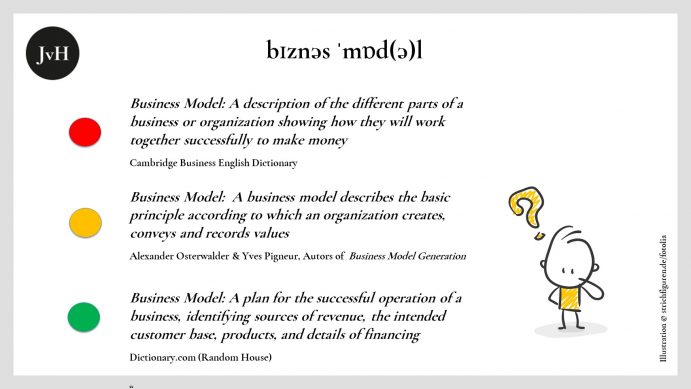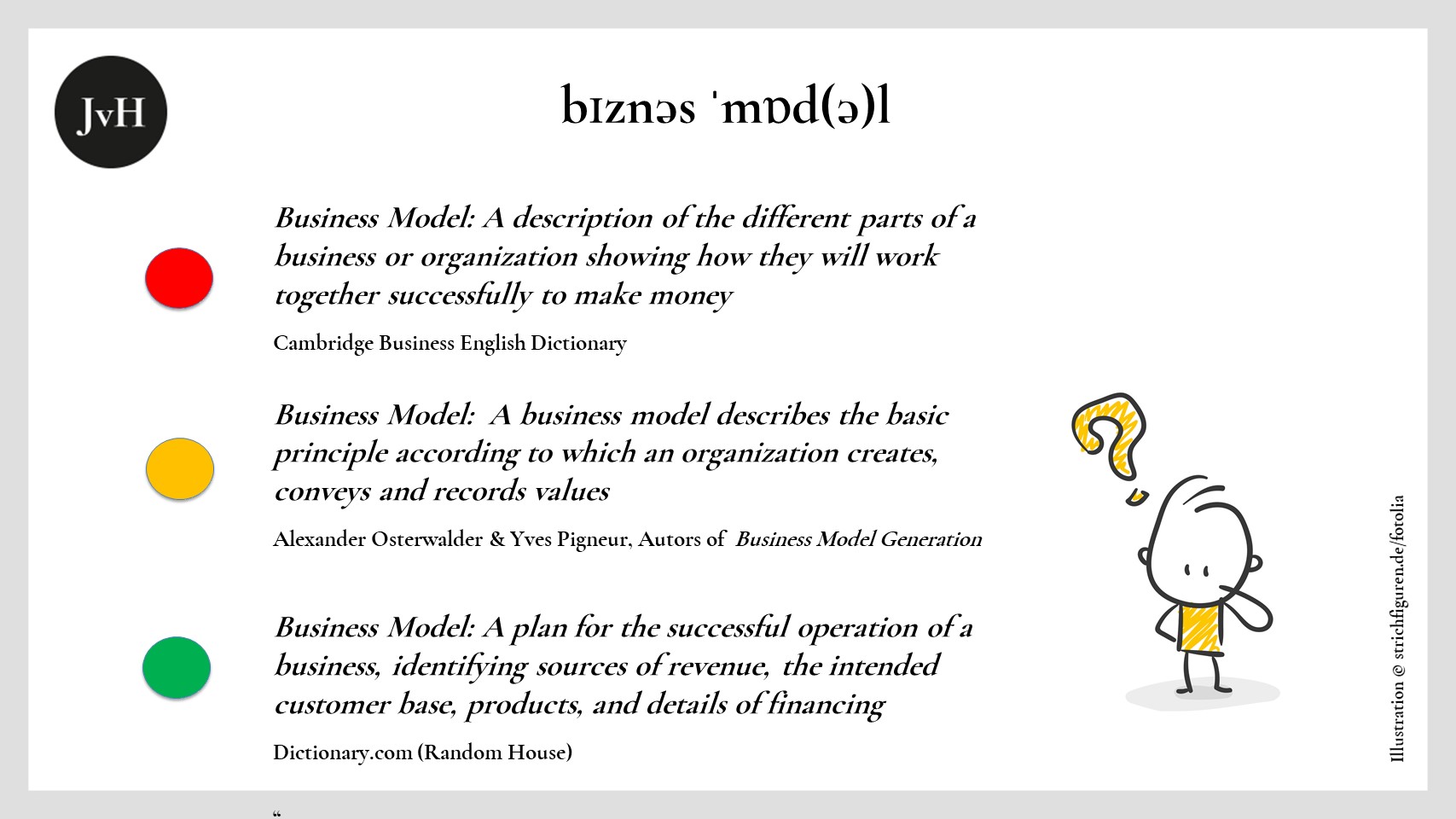What is your business model? Ask any founder. The likelihood that you will have to listen to a fairly long-winded recap of the start-up’s 100-page business plan or at least its pitch deck is larger than 80 per cent. Why is that so?
First of all: There is no uncontested definition of what exactly amounts to a business model.
Second: The more or less “official” definitions are either extremely general and thus unhelpful (Cambridge Business English Dictionary) or more concrete but semantically false (dictionary. com: a “model” cannot be a “plan”) or a combination of both (Osterwalder/Pigneur).
Osterwalder and Pigneur do of course know very well (presumably better than anybody else) what business model canvasses look like, and how to analyze their strengths and weaknesses. Interestingly though, even they have trouble defining them in a concise way. For what on earth is a “principle” on which a business is allegedly founded and what makes a principle “basic” as opposed to non-basic?
Take the following two well-established digital business models:
- Platform: The term “platform” alludes to a market place where users congregate to either communicate or gather information or execute transactions. This model allows for very different “revenue models” – subscriptions, pay-per-use, auction, data, display ads, programmatic advertising, affiliate marketing, to name but a few.
- e-Commerce: e-commerce can take place on internet platforms, individual websites on third-party sites etc. The term alludes to the type of revenue (commerce) and the PoS (“e” = Internet) but, unlike “platform” it says nothing whatsoever as to the waters where clients are being fished from.
So, e-commerce and platforms are by no means mutually exclusive although they are often presented as if they were. And similarly, “auction”, “pay per use”, “subscriptions” etc. are sometimes perceived as alternative business model “principles” parallel to platforms and eCommerce although “pay per use” might be the e-commerce principle of a platform site…
Similarly, again, “data” might either be the exclusive or at least dominant source of revenue of a platform that – also – generates all sorts of display or programmatic ad revenues. So where is the “basic” principle, then?
What appears evident is that “business model”, “revenue model”, and “business principle” are terms widely used in exchange for each other and without a common understanding of what is what in exact terms. The reason why I give Random House’s (dictionary.com’s) definition the highest mark is that it relates its definition of “business model” to a set of compulsory ingredients, which need to be intellectually manufactured and causally related within some sort of mechanical framework.
I value business definitions that are related to corporate actions and performances because these ingredients hardly ever require a definition of their own. Almost everybody either knows intuitively what a customer or revenue or a product is or is capable of finding out from a corporate handbook, whereas hardly anybody would be able to qualify or distinguish “basic” principles from mere “principles”.
I said this on several occasions and at different places before: Unless the whole company agrees on definitions you will never be able to measure and benchmark progress and performance.
And the easiest way to ensure corporate agreement on definitions is to follow the same procedural rules to arrive at outcomes such as, eg. leads, customers and earnings and then track by checklists or whatever that these rules are actually being observed.
Having said that, I am not so sure, if dictionary.com’s performance-oriented definition of a business model is really quite satisfactory, as it misses out on the “principle” that Osterwalder/ Pigneuer at least mention, thus allowing for a business model to qualify as opposed to one that does not, because it does not refer to a “basic principle” even though it might describe at length what type of revenue a certain business expects to gain from a certain type of customer on a certain type of premise in a certain type of shape, frequency, volume, etc.
Thus, we may perhaps arrive at the best possible definition of a business model by combining the Osterwalder/ Pigneur and the Random House approaches. We would then arrive at something like the following:
Business Model: A business model describes the basic mechanism according to which an organization creates, conveys and records value by defining and connecting the core sources of revenue, the intended core customer base, the core products, and financial resources with the core activities of the organization.


